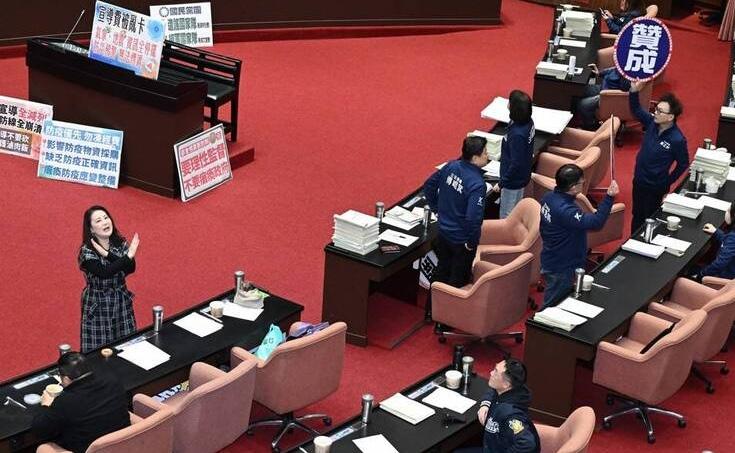The Legislative Yuan passed the central government budget this afternoon, cutting a total of 6.6 percent from the Cabinet’s proposal — the largest in history.
Revenue for the Cabinet’s proposed budget for this year was NT$3.1534 trillion (US$96.32 billion), with expenditures of NT$3.1325 trillion.
However, on Friday last week, opposition lawmakers voted in the majority to cut NT$93.98 billion from the budget’s general provisions.

Photo: Liao Chen-huei, Taipei Times
During a 20-hour continuous session from yesterday until this morning, they continued to slash the budgets of various government agencies.
Other cuts amounted to NT$113.6 billion, bringing the total budget cut to about NT$207.5 billion.
The Executive Yuan still needs to verify and implement budget cuts for various agencies.
Cuts from general provisions include a 10 percent cut to water and electricity fees, and 60 percent cut on special expenses.
Special expenses would be completely cut for the Executive Yuan, Mainland Affairs Council, Council of Indigenous Peoples, Ministry of the Interior, Ministry of Agriculture, Ministry of Digital Affairs, National Communications Commission, Ministry of Justice, Ministry of Civil Service, Control Yuan and Ministry of Labor.
There would also be a 3 percent cut on military equipment and facilities.
Media policy and promotion expenses would be uniformly cut by 60 percent, unless otherwise specified.
More controversial proposals include a 70 percent freeze on the Executive Yuan’s operational expenses, a 50 percent cut and 30 percent freeze on the Control Yuan’s operational expenses, a 50 percent freeze on the Ministry of National Defense’s submarine budget and a 50 percent freeze on the Ministry of Foreign Affairs’ operational expenses.

CHAOS: Iranians took to the streets playing celebratory music after reports of Khamenei’s death on Saturday, while mourners also gathered in Tehran yesterday Iranian Supreme Leader Ayatollah Ali Khamenei was killed in a major attack on Iran launched by Israel and the US, throwing the future of the Islamic republic into doubt and raising the risk of regional instability. Iranian state television and the state-run IRNA news agency announced the 86-year-old’s death early yesterday. US President Donald Trump said it gave Iranians their “greatest chance” to “take back” their country. The announcements came after a joint US and Israeli aerial bombardment that targeted Iranian military and governmental sites. Trump said the “heavy and pinpoint bombing” would continue through the week or as long

TRUST: The KMT said it respected the US’ timing and considerations, and hoped it would continue to honor its commitments to helping Taiwan bolster its defenses and deterrence US President Donald Trump is delaying a multibillion-dollar arms sale to Taiwan to ensure his visit to Beijing is successful, a New York Times report said. The weapons sales package has stalled in the US Department of State, the report said, citing US officials it did not identify. The White House has told agencies not to push forward ahead of Trump’s meeting with Chinese President Xi Jinping (習近平), it said. The two last month held a phone call to discuss trade and geopolitical flashpoints ahead of the summit. Xi raised the Taiwan issue and urged the US to handle arms sales to

State-run CPC Corp, Taiwan (CPC, 台灣中油) yesterday said that it had confirmed on Saturday night with its liquefied natural gas (LNG) and crude oil suppliers that shipments are proceeding as scheduled and that domestic supplies remain unaffected. The CPC yesterday announced the gasoline and diesel prices will rise by NT$0.2 and NT$0.4 per liter, respectively, starting Monday, citing Middle East tensions and blizzards in the eastern United States. CPC also iterated it has been reducing the proportion of crude oil imports from the Middle East and diversifying its supply sources in the past few years in response to geopolitical risks, expanding

Pro-democracy media tycoon Jimmy Lai’s (黎智英) fraud conviction and prison sentence were yesterday overturned by a Hong Kong court, in a surprise legal decision that comes soon after Lai was jailed for 20 years on a separate national security charge. Judges Jeremy Poon (潘兆初), Anthea Pang (彭寶琴) and Derek Pang (彭偉昌) said in the judgement that they allowed the appeal from Lai, and another defendant in the case, to proceed, as a lower court judge had “erred.” “The Court of Appeal gave them leave to appeal against their conviction, allowed their appeals, quashed the convictions and set aside the sentences,” the judges